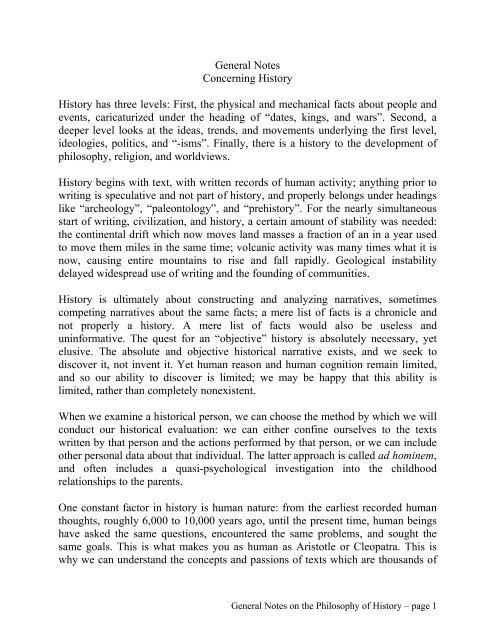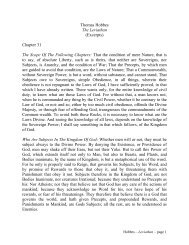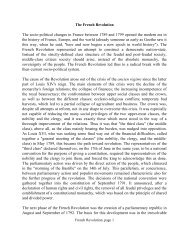General Notes about History
General Notes about History
General Notes about History
You also want an ePaper? Increase the reach of your titles
YUMPU automatically turns print PDFs into web optimized ePapers that Google loves.
<strong>General</strong> <strong>Notes</strong><br />
Concerning <strong>History</strong><br />
<strong>History</strong> has three levels: First, the physical and mechanical facts <strong>about</strong> people and<br />
events, caricaturized under the heading of “dates, kings, and wars”. Second, a<br />
deeper level looks at the ideas, trends, and movements underlying the first level,<br />
ideologies, politics, and “-isms”. Finally, there is a history to the development of<br />
philosophy, religion, and worldviews.<br />
<strong>History</strong> begins with text, with written records of human activity; anything prior to<br />
writing is speculative and not part of history, and properly belongs under headings<br />
like “archeology”, “paleontology”, and “prehistory”. For the nearly simultaneous<br />
start of writing, civilization, and history, a certain amount of stability was needed:<br />
the continental drift which now moves land masses a fraction of an in a year used<br />
to move them miles in the same time; volcanic activity was many times what it is<br />
now, causing entire mountains to rise and fall rapidly. Geological instability<br />
delayed widespread use of writing and the founding of communities.<br />
<strong>History</strong> is ultimately <strong>about</strong> constructing and analyzing narratives, sometimes<br />
competing narratives <strong>about</strong> the same facts; a mere list of facts is a chronicle and<br />
not properly a history. A mere list of facts would also be useless and<br />
uninformative. The quest for an “objective” history is absolutely necessary, yet<br />
elusive. The absolute and objective historical narrative exists, and we seek to<br />
discover it, not invent it. Yet human reason and human cognition remain limited,<br />
and so our ability to discover is limited; we may be happy that this ability is<br />
limited, rather than completely nonexistent.<br />
When we examine a historical person, we can choose the method by which we will<br />
conduct our historical evaluation: we can either confine ourselves to the texts<br />
written by that person and the actions performed by that person, or we can include<br />
other personal data <strong>about</strong> that individual. The latter approach is called ad hominem,<br />
and often includes a quasi-psychological investigation into the childhood<br />
relationships to the parents.<br />
One constant factor in history is human nature: from the earliest recorded human<br />
thoughts, roughly 6,000 to 10,000 years ago, until the present time, human beings<br />
have asked the same questions, encountered the same problems, and sought the<br />
same goals. This is what makes you as human as Aristotle or Cleopatra. This is<br />
why we can understand the concepts and passions of texts which are thousands of<br />
<strong>General</strong> <strong>Notes</strong> on the Philosophy of <strong>History</strong> – page 1
years old: because the authors shared the same unchanging human nature which we<br />
all have.<br />
Partly because we all share this same human nature, and perhaps partly for other<br />
reasons, there are “eternal questions” which recur throughout history. Historians<br />
disagree on exactly how many “eternal questions” there are, but here’s an example<br />
of what three of them might be:<br />
• How can I escape my “subjective bubble” (my ideas, perceptions, and<br />
opinions) and obtain objective knowledge?<br />
• Does God love me or hate me, and why?<br />
• How should a community or society be organized? How should society<br />
and government interact?<br />
There are many other candidates for “eternal questions”. Suggest some.<br />
It becomes necessary to clearly and rigorously define some words: “history”,<br />
“religion”, and “philosophy”.<br />
The role of religion in civilization and history is both significant and obvious. The<br />
emergence of religion from early, non-religious phases of civilization is not so<br />
obvious.<br />
Early civilization embraces myth, magic, and manipulation, and lacked religion.<br />
Myth explained; magic and manipulation were attempts to control the forces of<br />
nature, obtain fertility, and ensure military victories. This type of polytheistic<br />
paganism prescribes some ritual or sacrifice designed to persuade a deity to deliver<br />
the goods.<br />
Religion concerns relationships: the individual’s relation to God, and to other<br />
humans. A religion has a text and a founder. Religion is an attempt to bridge the<br />
gap between the perfect/infinite deity and the imperfect/finite human. Religion is<br />
personal, inasmuch as it treats both the human and the deity as person, i.e., having<br />
beliefs, desires, emotions, and agency. Religion is not private, inasmuch as it<br />
encompasses visions of society. A religion is related to a way of life; it has various<br />
forms in different times and places; it can be related to geography.<br />
<strong>General</strong> <strong>Notes</strong> on the Philosophy of <strong>History</strong> – page 2
Religion is NOT ethics and morals, is NOT traditions, rules, culture, opinions,<br />
beliefs.<br />
Three cornerstones of civilization, as it emerged in the ancient world: (1) the<br />
alphabet replaces other symbolic forms, (2) monogamy is valued, (3) human<br />
sacrifice is gradually phased out.<br />
Another recurring theme in history is the tension between centralized and<br />
decentralized forms of government. From Persia to Rome, from Alexander the<br />
Great to the Holy Roman Empire, this will be a consideration; feudalism, often<br />
derided as an archaic system, proves to be, in this light, a champion of local<br />
independence and of decentralization. It is also no accident that the series of “Star<br />
Wars” films by George Lucas echoes the events of Roman history.<br />
As we look at historical texts, we will need to be alert to issues of translation and<br />
transliteration.<br />
Maps are also an important part of studying history.<br />
There are different ways to look at historical change: it might be an organic<br />
process, working its way gradually through societies and populations in the<br />
attitudes and decisions of the average person, or it might be the decisive choice of<br />
one man at a crucial moment. <strong>History</strong> is either a series of historical choices by<br />
great men at decisive moments, or it can be told as a gradual process of growth and<br />
change in slow waves and trends through entire communities, cultures, and<br />
civilizations.<br />
Population and Economics: the pattern seems to be that a steadily growing<br />
population is the best circumstance for economic prosperity and stability, as well<br />
as political tranquility. If the population grows too quickly, too slowly, or<br />
erratically (i.e., the annual rate varies too much from one year to the next), or if the<br />
population does not grow at all, or even shrinks, then economic hardship is<br />
inevitable. This pattern is relevant to events both in the Roman Republic and the<br />
Roman Empire. It is relevant also to the study of Thomas Malthus, whose brilliant,<br />
but sadly mistaken, views have been overturned the discovery of the fact that our<br />
planet has always produced more food than was needed by the humans living on it,<br />
and that all hunger and starvation has been unnecessary, and the result of human<br />
incompetence or greed.<br />
<strong>General</strong> <strong>Notes</strong> on the Philosophy of <strong>History</strong> – page 3
Since the time of Moses, we see that the majority trend within “western” or “Eurocentric”<br />
civilization has held a certain “sympathy for the underdog”, a tendency to<br />
consider, and act in, the interests of those who are most vulnerable in society.<br />
Notable exceptions, of course, exist, in the persons of Nietzsche, Hitler, and Stalin.<br />
But general trend has held, and perhaps even gained in predominance, over time.<br />
This strength, however, of our civilization has also recently become a weakness,<br />
because those who wish to gain power by claiming to be victims can exploit this<br />
sentiment. It has now become necessary to distinguish between those who are at<br />
the bottom of societal structures and those who merely claim “victim status” as a<br />
path to political power. In non-western, or non-Eurocentric societies, this path to<br />
power is not open.<br />
The events of history take place within the framework of time, space, matter, and<br />
energy. Another way of saying this is that the events of history involve elements<br />
that are, at least in principal, directly or indirectly detectable by the five senses. We<br />
need to be aware that these are the minority of events. The majority of events are<br />
composed of elements that lie outside of space and time, which are therefore not<br />
composed of matter or energy, and not detectable to the five senses. Strictly<br />
speaking, history does not concern itself with such things. Practically, however, we<br />
will concern ourselves with them to some extent, when we consider the history of<br />
philosophy and the history of religion. We need to be aware, then, that we have, at<br />
that point, left behind history, narrowly defined, and entered a separate field of<br />
study.<br />
Given that text is central to historical study, issues of language will interface; at a<br />
minimum, we will need to continuously acknowledge that we are dealing with<br />
texts that are either translated into our language, or written in an older form of our<br />
language. Philology is relevant to history.<br />
<strong>General</strong> <strong>Notes</strong> on the Philosophy of <strong>History</strong> – page 4















